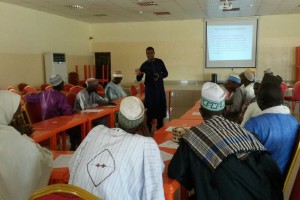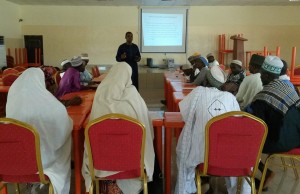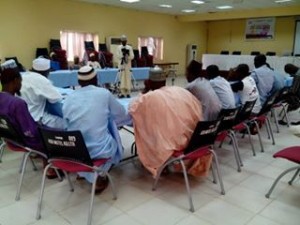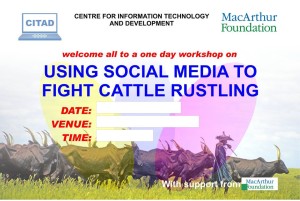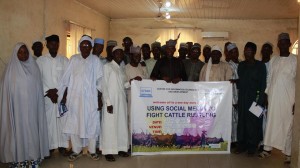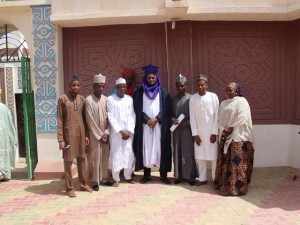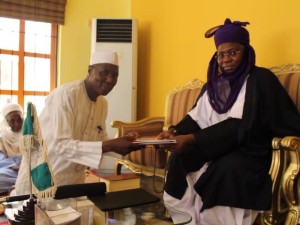INTRODUCTION:
The Centre for Information Technology and Development (CITAD) with support from USAID organized a Stakeholders Meeting on the State of Education in the Northeast, the meeting held at the Custodian Hotel, Gombe on 27th July 2015 brought representatives from ministries of Education, Nigeria Union Of Teachers (NUT), Parent and Teachers Association (PTA), SUBEB, School Based Management Committees, CSOs and academics from all the six states of the region. Chaired by Prof Abdullahi L. Tukur, a Chairmen SUBEB Chairman and ex-Secretary top the Adamawa State Government, the meeting had the objective of getting the various stakeholders appreciate the new project that CITAXD is currently implementing in the region to seek their cooperation and support to ensure its success.
The meeting started with opening remarks from the chairman, Prof Tukur who observed that the North East Region was educationally backward. He said that while the population of the region could be of good advantage against other regions at the moment this was yet to be harnessed. He noted that all the slogans of the states have turned out hollow and not reflecting the true situations in the states today. He therefore urged that it was time for us to better sit and think on how to change and this can be done by addressing the problems of the education system in the region.
He suggested adopting some of the following to serve as our core values in addressing our problems.
i. Care and concern: in terms of how we obtain our information not to deviate or fall to deception. And to always have a fallback position since saying the truth, sometimes become a problem.
ii. Cooperation, but compromise: Rigidity may not always be the ultimate, compromise can be driven to good results.
iii. Development work to serve the people than the personal interest of leaders.
iv. Commitment: To patience, perseverance and sincerity of intensions.
v. The education system in the North East has the ability to serve 9.2 million people.
vi. Consistency: In our instrument of measurement to reflect ways of conducting how things should be appropriated by the best (merit) and defy from faith, etc.
This was followed by a presentation on the project, entitle Engaging Stakeholders For Enhanced Educational Governance in the North East Region by Y. Z. YA’U of CITAD. The presentation explained what the project was all about, its objectives, framework, components and expected outcomes. He started by saying that this was a journey from a crisis period to take us out of the crisis into a post-crisis era that required a post-crisis agenda. He said the crisis period is characterized by the current insurgency in the region which is the result of a combination of factors including low educational attainment, poverty, unemployment, poor governance and weak civil society. He said the overall goal was to galvanize all stakeholders toward a comment engagement to revamp the education sector as a key to addressing the myriad of development challenges of the region. He argued that Education was central in addressing the issue of insurgents in the region. He said that given the enormity of the problem, we need all stakeholders to come together, discuss the problem identify solutions; assign roles and responsibilities and together work to ensure that the solutions are implemented. The project hopes to see an increase in access to education, improvement in quality of education, gender parity in educational achievement, mainstreaming of disability issues in the education architecture of the region and addressing the education needs of internally by displaced people. He listed the key components of the project as including baseline survey on the state of education in the region (which had already commenced with an earlier methodology workshop held for the researchers), Public engagements, developing ICT Tools for Expenditure Tracking,, advocacy and regular public engagements. This would be done with the key stakeholders including PTAs, Ministries of Education, SUBEB, SBMCS, ANCOPS, NUT and the legislatures.
- He said that the survey component for which we solicit the support and cooperation of all the stakeholders was to enable us fully understand the problems of the sector in empirical way with data and information to substantiate it. We expect the outcome of the survey to give us a better knowledge of the funding profile in education sector, education dynamics in the states and education outcomes.
As public engagement driven project, there would be robust public Awareness programme using various means including radio programs, drama, radio jingles, use of social media and public meetings such as this to discuss, share information and to keep the problem on the door step of every individual.
Following the presentation, a question and answer opportunity was provided for participants to either seek further clarification or make more input to the project. Among the key observations were:
Prof. Tukur, the chairman of the meeting raised the following observations. To re-incorporate our commitment to the survey could be a bit rough, taking in to consideration of each state to be an island of its own. In addition governance, peace and security as the key point of the survey, however as a tourist destination, if networks of roads can be crisscrossed, Mambila alone can save the whole of Africa with beverages.
He stated also that, we need government to strategize to stop insurgency otherwise, development cannot take place.
Proportion of students ration in the North East in comparison with its counterpart regions of the south-south and south west for example is too higher and that if half percent commitment given to private schools is committed to public schools, there would be improvement. Observing also that, outcome of the survey should go beyond the government but to involve everybody, adding that the state own schools are not making it at the tertiary institutions.
Ayo Oladini, made his own observation that series of projects have been funded by USAID, America, Japanese but the question here is; Do we share?
Adamu Baba: Also raised the observations that:
1. The pride in being a Teacher is in the product the quality of the instructional delivery is the most important. That there is the need to sit with NUT, and ask the question whether the products are theirs and how so that we can ask them what they want so that if provided we tasks them to achieve quality.
2. Resources: That the North East has resources, according to him, little resources advanced to development partners achieve a lot therefore, the need to harness local partners to achieve result.
3. Political Will: That there is no political will by the six North Eastern States Governments to demonstrate with partners. Though, Gombe State Governor, in order to address the youth confrontation of the “Kalareâ€, travelled to Lagos, to borrow a leaf of how the youth OPC of Lagos was addressed They were rehabilitated and employed as security personnel, while others trained on various skills acquisition.
Also government does not want to listen, while civil societies have keen interest.
Adamu Muhammad: From North East Youth Initiative Forum (Yobe State), observed that, Nigerians are good planners, infrastructure wise, Teachers, learning-teaching environment, but without improving the standard of teachers welfare. Incentives to teachers be considered such as; accommodation, training, promotions, prompt payment of salaries etc. To him, government are to be blame most and not teachers.
Suleiman Darazo, the team leader for USAID commended on the strategies employed by Y. Z. Ya’u, the Executive Director CITAD, in his presentation to move the state of education in the North East forward. But however, pointed out that, there is no stated clear level of education that the project intends to focus on. And that there is also the need for linkages on how problems will make meaning on the whole issues.
Adamu Muhammad: According to him, proper monitoring and evaluation is what differentiate between the quality of performance in public and private schools. And that passion and commitment is lost out of the teaching profession. Observing also that, prior to the insurgency, North East educational background was on the retrogression. Though, the situation worsening at present and has hindered on development.
That schools being used as IPD’s camp, deprive learning of incumbent students and a double lost. Parents and students morale have drastically reduced to attending schools in Yobe State, considering high level of insecurity in the State.
Juju Mamman from Maiduguri: Raised the observation that, politics and our youths have played a lot in the educational backwardness in the North East. Researches upon the fact that, an educated youth, when does not participate in politics, could hardly live the affluent life style of the illiterate or half educated youth in politics resulting in a demoralized spirit for learning.
And cannot ascertain what actually is wrong with our teachers. Is it that our children cannot deliver? She also made the observation of what is happening in the teaching profession nowadays to be the same with what is obtainable in our hospitals. The profession has turned out a “call inâ€. Interest, preferential treatment in the posting of teachers rather than need by schools have over shadowed the systems.
Next time was the keynote address on the topic Education as key to the Development of the North East by Dr. Shu’aibu Musa,, Rector Federal Polytechnic, Bauchi and former Commissioner of Education, Bauchi State. He started by reviewing the concept of education in three perspectives, ie : General Education: This is critical to economic growth and poverty reduction and requires getting children enrolled in schools in turns need the actions of CSOs, functioning of democratic and governance institutions. Second is Girl Child Education for healthier children, justice and equity, improved family life and better society. Thirdly, Technical and vocational education that should imparts skills and competences, aids production of goods and services and provides massive employment.
He reviewed the state of education in the North Eastern States as characterized by
1. Training: The region is generally trailing other regions in the positive indicators; but also leading in negative indicators.
2. Situation worsening due to insurgency.
3. Drew a table of enrolment where a national demographic survey figures revealed 8.8% university enrolment of North East to 24% of the South-south.
He suggested as strategies and priorities the following:
1. strengthening of ministries and state UBEs:
-Â Project identification and contract administration.
-Â Provision of infrastructural materials.
-Â Enhance PTA and community participation and completion.
2. Repair/rehabilitation and provision of additional schools.
3. Up scaling of Almajiri and nomadic schools.
4. Teacher education and training workshops.
5. Strengthening of inspectorate departments.
6. Special attention to technical and vocational education.
-Â regularize appropriate system.
-Â Establish technical and vocational centres.
-Â Special scholarships for students in technical and vocational education.
Observations:
Adamu Baba Audu: observed that there was problem in 2006 with Federal Government Teachers Scheme and also how to justify the fake results being issued with genuine signature of provost or registrar of schools? Could this be attributed to the institution or new technology? That students themselves have no commitment to learning but instead bribe their ways to get through system.
Muhammad Magaji: PTA Chairman Gombe stated that politics has completely been messed the education sector. To him, there is improper funding of schools, inflating credits in examinations, wonders if this could be attributed to teachers, government or who? Insurgency also serving a key factor, truth needs to be told, segregation in terms of education, teachers’ welfare neglected. All these combined to set a drawback to education in the North East.
Rebecca Hassan: reported on incident of a Federal Poly student who lost her eye sight and pleaded for an avenue to continue her education, drawing attention to the problems of people with disability in the education sector in the region.
Shu’aibu Adamu, delivered a message by North East coordinator sign language interpreters associatio that disabled people should be included in the normal schools and a sign language for the deaf be improved upon in our schools. Parents of the disabled be enlightened on how to relate with their children who have such problems. Also the North East states should have special education centers included in their tertiary institutions.
Mrs. Loise: representative of Ministry of Education, Bauchi, observed two (2) factors responsible to the state of education in the North East.
1. Teachers quality
2. Quality assurance
Changing the nomenclature from inspectorate to quality assurance to her did not yield result. Inspectorate she said was feared most to the name quality assurance.
Finanga Yakubu Amtassa, MAUTech, Yola Observed,
1. Quality of Teachers:
Most teachers pick up teaching as a last resort. This point has turned out to be a national issue. With the situation worsening in the North Eastern states, the same scenario affects every sector. The number of schools drop outs is on the high rate. He stated that only education sector and doctors are in real work force. That even responsible literate parents, bribe in respect of their children to pass examinations.
Alh. Baba Lawal of NUT, Maiduguri observed that in view of all other submissions, education is the responsibility of all. No one section is to blame.
Most of the teachers attended a crash program at the NCE. Unlike in those days that from on set of NCE, you are assigned a pupil class to manage, government should look inward to revisit teachers training, employment, and its conditions.
Most a times there are no interest to teaching profession. Posting conditions too is out of place. Posting is on the basis of interest and not need by schools. Incentives are not provided.
Sale Mabudi, Director Inspectorate, Gombe commended the presentation to be an excellent presentation to have touched basics and even post basics, citing example with the problems in the health sector in the North East.
Believing also that education is key to development. Increase funding in to education would improve upon the system. Politics have played a vital role, Ministry of Education, SUBEB are constrained by political influence in areas as posting, recruitment, etc. Politicians should be sensitized not to interfere into education sector. Commended the present Gombe State administration in terms of schools construction in areas that are hardy accessible. Teachers’ recruitment has increased, but the organization is still faced with problems of resignations of teachers on weekly basis. In order to retain them, incentives have to be enhanced in relation to posting to rural areas in particular and other welfare. This is addition to the high number of people seeking admissions into schools as a result of the insurgent activities as they share boundaries with highly affected areas. Advocacy should be paid to parents to enroll their children in schools to overcome the outrageous number of school age children at home.
Samson Ada, Director Inspectorate Division, Taraba State, admitting to all other points stated by other stakeholders, stressed emphasis on training and strengthening inspectorate division and providing adequate fund. He also observed that the chief executives of the State needed be reminded to fulfill their campaign promises because at times you budget, but funds not really released.
Lawall El-Rufa’i, commended the presenter, but also admit that even those with the NCE and B.Ed, pick up the appointment as a last resort and as such cannot make a quality teachers. Passion and commitment have to be inculcated hence, the need to call for Grade II teachers. Most often also the NCE students are school dropouts, who hardly could cope with academic stress, and are encouraged to pick NCE course at tertiary institution.
Political interventions have also contributed in distorting the system. Appointment into education offices should be considered on education experience and qualification and not political inclined partners.
Halimatu Laminu, observed also that, teachers employed without teaching qualifications should be re-oriented on teaching methods, to be able have effective teaching-learning class control and to also deliver.
Kawu Munguno, University of Maiduguri, stressed the emphasis on the following points
1. Quality of leadership. Criteria for leadership most be ear-marked. To him, all his local government chairmen must have a minimum degree qualification.
He added by given an example of a campaign statement of a contestant that, “If you vote for me, I will not force your children to come to school.†And asked could be said about such a person to improving education in the sector.
2. Attitudinal Change of everybody is essential. Sentiments overrides procedures and competency, that even at the university level, people bring in their wives to become lecturers even when they cannot deliver. Wonders if such could happen at the university level, it could extend to all other sectors.
3. Integration: Schools are homogenous in nature and a reflection of the whole country, contrary to what is happening at present.
He added that, there is beauty in diversity which boils down to our manner. We should allow other people different from our communities to be part of our educational system. He solicited as a researcher for support and cooperation to provide them with necessary information to help put on record to get the education institution right.
Responses to key points in observations raised by respective stakeholders by Dr. Shu’aibu, Rector Federal Polytechnic:
1. That it is interesting that people are taking about Teachers, funding, inspectorate as parameters.
2. Funding: Judicious utilization of what is being funded should be advocated.
3. Counterpart funding: Money is budgeted, but is not met. Therefore we need attitudinal change.
4. Teacher Education: Agreed that there is a missing link when the Federal Government decided to abolish the teachers colleges, he rejected the decision as commissioner for education, but all his could not see the light of the day. Teacher training must be taken seriously he said. Instructional materials without instructor, is nowhere he said.
5. Politics: Education is politicized in terms of structuring of schools, recruitment, posting etc. and must be stopped.
6. Monitoring and Evaluation (Inspection): Facilities and transportations should be provided. In addition to recommendation made during inspection be executed.
7. Constant change in policy: The constant change in different policies, without allowing policies to mature has an adverse effect on educational draw back.
8. Fake Results: The value attached to paper qualification has resulted in such situations. A typical example in Bauchi where three (3) people presents one result for appointment.
The attempt to screen teachers in Bauchi and Edo States to ensure quality was rejected by Union leaders. Any agency recruiting should adapt the policy of verification in order to minimize such act.
9. In respect of the student who lost her sight; we should be in be in position to advocate for social inclusion of people living with disabilities in the three levels of education; primary, secondary and tertiary institutions. And that contact would be made to find possible university admission in her favour to accommodate the student at the University of Jos.
10. Social Inclusion: Basic and post basic agitation for inclusion should be taught to attain the same school with other normal children rather than segregation.
JAMB conducted effective and successful UTME examinations this year for people with special needs. Commitment should be involved to achieve such.
The last session was a brief presentation on challenges in understanding the state of education in the north east by Dr. Raji Boye of the Yobe State University. He said the objective of his presentation was to raise some key challenges that the baseline survey researchers were likely to face and therefore seek the support of
1. Enrolment, i.e. for the students to still remain in class not being chased to come to school. He also stressed that the gap is still widening.
2. Low Funding: we need to know what funds go into the sector and how it is being used and managed.
3. Qualitative education: what are the key indicators for quality of education in the region and how can these be measured?
4. Functioning schools: how do we capture the state of the schools in terms of facilities, equipment, teachers, etc.
5. Availability and Collection of Data (Statistics). What level we are and what level are we going? i.e. getting accurate and the willingness of the officers to give the data for work,.
To get the following data such as number of enrolment, structure, disability, teachers and their qualification, students enrolled and remain in schools, facilities such as electricity, water, etc. he ended by presenting the researchers to the stakeholders.

